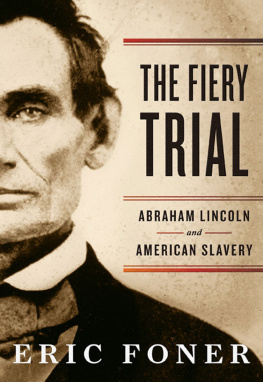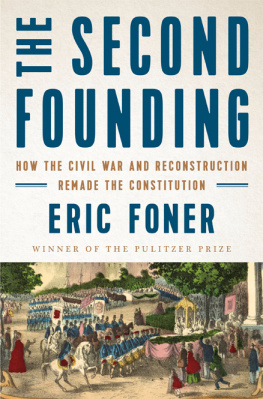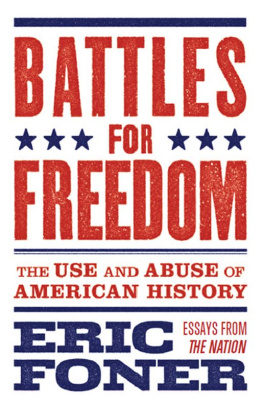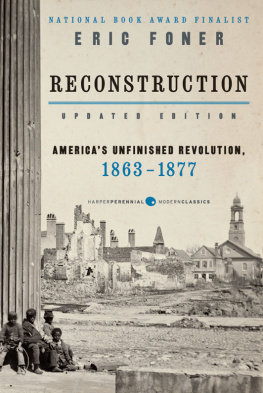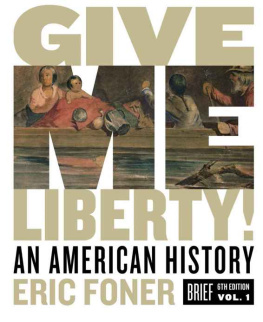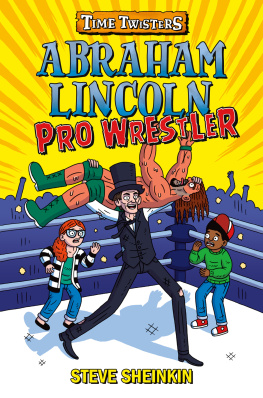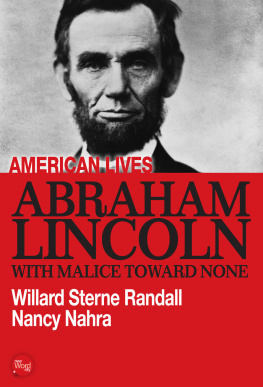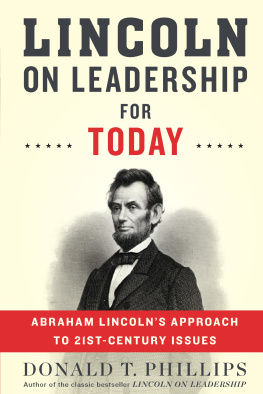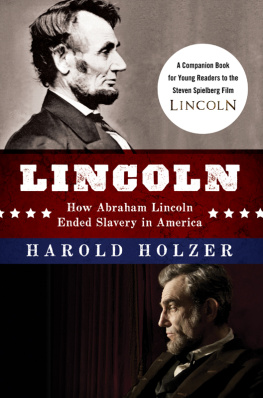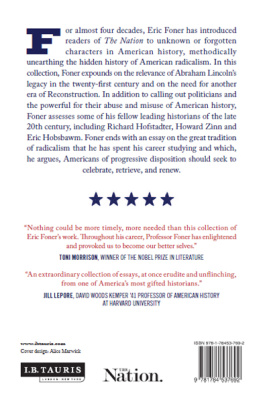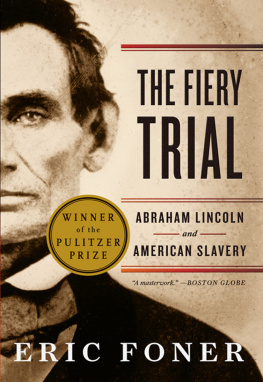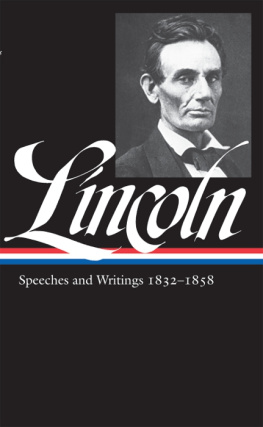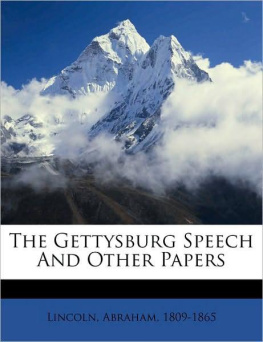Eric Foner - The Fiery Trial: Abraham Lincoln and American Slavery
Here you can read online Eric Foner - The Fiery Trial: Abraham Lincoln and American Slavery full text of the book (entire story) in english for free. Download pdf and epub, get meaning, cover and reviews about this ebook. year: 2011, publisher: Norton, W. W. & Company, Inc., genre: Science. Description of the work, (preface) as well as reviews are available. Best literature library LitArk.com created for fans of good reading and offers a wide selection of genres:
Romance novel
Science fiction
Adventure
Detective
Science
History
Home and family
Prose
Art
Politics
Computer
Non-fiction
Religion
Business
Children
Humor
Choose a favorite category and find really read worthwhile books. Enjoy immersion in the world of imagination, feel the emotions of the characters or learn something new for yourself, make an fascinating discovery.
- Book:The Fiery Trial: Abraham Lincoln and American Slavery
- Author:
- Publisher:Norton, W. W. & Company, Inc.
- Genre:
- Year:2011
- Rating:5 / 5
- Favourites:Add to favourites
- Your mark:
- 100
- 1
- 2
- 3
- 4
- 5
The Fiery Trial: Abraham Lincoln and American Slavery: summary, description and annotation
We offer to read an annotation, description, summary or preface (depends on what the author of the book "The Fiery Trial: Abraham Lincoln and American Slavery" wrote himself). If you haven't found the necessary information about the book — write in the comments, we will try to find it.
The Fiery Trial: Abraham Lincoln and American Slavery — read online for free the complete book (whole text) full work
Below is the text of the book, divided by pages. System saving the place of the last page read, allows you to conveniently read the book "The Fiery Trial: Abraham Lincoln and American Slavery" online for free, without having to search again every time where you left off. Put a bookmark, and you can go to the page where you finished reading at any time.
Font size:
Interval:
Bookmark:
Free Soil, Free Labor, Free Men: The Ideology of the Republican Party before the Civil War (1970)
Americas Black Past: A Reader in Afro-American History (editor, 1970)
Nat Turner (editor, 1971)
Tom Paine and Revolutionary America (1976)
Politics and Ideology in the Age of the Civil War (1980)
Nothing but Freedom: Emancipation and Its Legacy (1983)
Reconstruction: Americas Unfinished Revolution, 18631877 (1988)
A Short History of Reconstruction (1990)
A House Divided: America in the Age of Lincoln (with Olivia Mahoney, 1990)
The New American History (editor, 1990; rev. ed. 1997)
The Readers Companion to American History (editor, with John A. Garraty, 1991)
Freedoms Lawmakers: A Directory of Black Officeholders during Reconstruction (editor, 1993; rev. ed. 1996)
Thomas Paine: Collected Writings (editor, 1995)
Americas Reconstruction: People and Politics after the Civil War (with Olivia Mahoney, 1995)
The Story of American Freedom (1998)
Who Owns History? Rethinking the Past in a Changing World (2002)
Give Me Liberty! An American History (2004; rev. eds. 2007, 2010)
Voices of Freedom: A Documentary History (editor, 2004; rev. eds. 2007, 2010)
Forever Free: The Story of Emancipation and Reconstruction (2005)
Herbert Aptheker on Race and Democracy: A Reader (editor, with Manning Marable, 2006)
Our Lincoln: New Perspectives on Lincoln and His World (editor, 2008)
Abraham Lincoln and American Slavery

W. W. Norton & Company New York London
Copyright 2010 by Eric Foner
All rights reserved
For information about permission to reproduce selections from this book, write to Permissions, W. W. Norton & Company, Inc., 500 Fifth Avenue, New York, NY 10110
Library of Congress Cataloging-in-Publication Data
Foner, Eric.
The fiery trial: Abraham Lincoln and American slavery / Eric Foner.1st ed.
p. cm.
Includes bibliographical references.
ISBN: 978-0-393-08082-7
1. Lincoln, Abraham, 18091865Views on slavery.
2. SlavesEmancipationUnited States. I. Title.
E457.2.F66 2010
973.7092dc22
2010023425
W. W. Norton & Company, Inc.
500 Fifth Avenue, New York, N.Y. 10110
www.wwnorton.com
W. W. Norton & Company Ltd.
Castle House, 75/76 Wells Street, London W1T 3QT
To Henry Foner
MAPS
ILLUSTRATIONS, between Chapter 6 and Chapter 7
Fellow-citizens, we cannot escape history. We of this Congress and this administration, will be remembered in spite of ourselves. The fiery trial through which we pass, will light us down, in honor or dishonor, to the latest generation.
A BRAHAM L INCOLN, December 1, 1862
E VER SINCE his death a century and a half ago, Abraham Lincoln has provided a lens through which we Americans examine ourselves. As an icon embodying the societys core values and mythsself-made man, frontier hero, liberator of the slaveshe exerts a unique hold on our historical imagination. Lincoln has been described as a consummate moralist and a shrewd political operator, a lifelong foe of slavery and an inveterate racist. Politicians from conservatives to communists, civil rights activists to segregationists, and members of almost every Protestant denomination as well as nonbelievers, have claimed him as their own. As early as 1870, the Memorial Lincoln Bibliography listing books, eulogies, sermons, and ephemera ran to 175 pages. Today the Lincoln literature comprises many thousands of works. In the last decade, his psychology, marriage, law career, political practices, literary style, racial attitudes, and every one of his major speeches have been subjected to minute examination. There are even books about the myths and hoaxes surrounding Lincoln.
In a way we have found it too easy to understand Lincoln. We think we know him, because in looking at Lincoln we are really discovering ourselves. Hence, he seems perennially relevant; he is always our contemporary. And, of course, issues of Lincolns era such as the enduring legacy of slavery, the nature of presidential leadership, the relationship between morality and politics, and the definition of American nationality and citizenship remain as urgent today as when he lived. In his own time, however, people found Lincoln in many ways enigmatic. A self-controlled, intensely private man, he seldom disclosed his innermost thoughts, even to close friends. David Davis, who knew Lincoln well, described him as the most reticent, secretive man I ever saw or expect to see. Lincoln could be gregarious and outgoing, but he did not reveal himself to others. No man can tell by any conversation with the president (and he is very free in talk ) whether he means what he says, or designs only to extract ideas, wrote one government employee who spoke with Lincoln frequently during the Civil War.
Lincoln jotted down notes and private musings on public issues, but he kept no diary and wrote few personal letters. Records of the law cases in which Lincoln participated have recently become available in digital form, but The Collected Works of Abraham Lincoln runs to a mere eight volumes plus two thin supplements and consists mostly of speeches and wartime directives. By contrast, the Papers of Thomas Jefferson consists of forty volumes to date and has only reached the first year of Jeffersons presidency. To fill in the gaps in the historical record, many writers rely on recollections of Lincolns words related long after they were spoken and often of dubious reliability. Once Lincoln died, of course, such memories were filtered through his apotheosis as the Great Emancipator. For this reason, I have preferred in the chapters that follow to cite Lincolns words as recalled by others only if they were recorded at the time they were spoken. Later recollections are clearly identified as such.
In some ways, the private Lincoln will forever remain elusive; to plumb his thoughts we must rely on his actions and his public letters and addresses. Fortunately, Lincoln not only had a command of the English language matched, among presidents, only by Jefferson but also was a deliberate and meticulous writer who chose his words with extreme care. Like any politician, he said things for strategic reasons. Moreover, his views changed over time. Yet at each point in his career his public statements revealed a consistency that allows us to take him at his word.
This book traces the evolution of Lincolns ideas and policies about slavery from his early life through his career in the Illinois legislature in the 1830s, his term in Congress in the 1840s, his emergence as a leader of the new Republican party in the 1850s, and his presidency during the Civil War. It is intended to be both less and more than another biography. The chronology of Lincolns life has been traced in numerous works from the brief to the multivolume, and there is no need to tell the story again. (Those who wish to consult a chronology focusing on Lincoln, slavery, and emancipation will find one at the end of this book.) Many aspects of his career, including his marriage and law practice and the military course of the Civil War over which he presided, do not appear here except to the extent that they illuminate his relationship with slavery. But what follows is also more than a biography because my aim is to situate Lincoln within what Charles Sumner, the most outspoken foe of slavery in the U.S. Senate, called the antislavery enterprise. This social and political movement encompassed a wide variety of outlooks and practices. At one extreme, it included abolitionists who worked outside the party system and advocated an immediate end to slavery and the incorporation of the freed slaves as equal members of society. It also included those who adhered to what Sumner called strictly constitutional endeavors, including steps to prevent the westward expansion of slavery and, in some cases, plans for gradual emancipation with monetary compensation to slaveowners and the colonization of the freedpeople outside the United States. At various times, Lincoln occupied different places on this spectrum.
Font size:
Interval:
Bookmark:
Similar books «The Fiery Trial: Abraham Lincoln and American Slavery»
Look at similar books to The Fiery Trial: Abraham Lincoln and American Slavery. We have selected literature similar in name and meaning in the hope of providing readers with more options to find new, interesting, not yet read works.
Discussion, reviews of the book The Fiery Trial: Abraham Lincoln and American Slavery and just readers' own opinions. Leave your comments, write what you think about the work, its meaning or the main characters. Specify what exactly you liked and what you didn't like, and why you think so.

